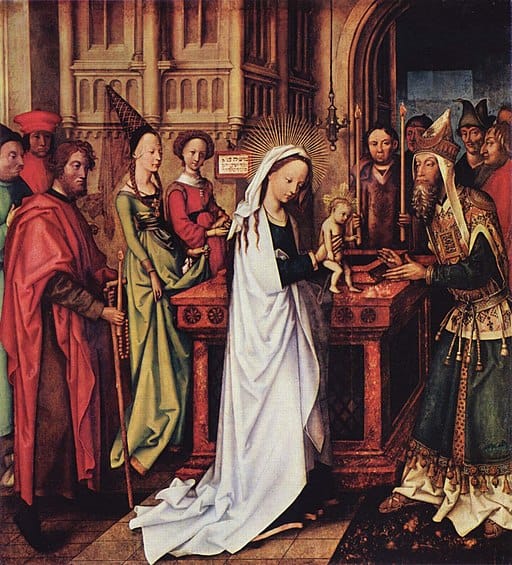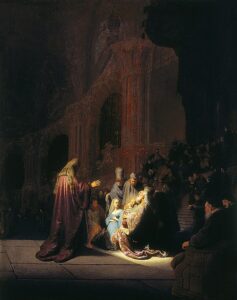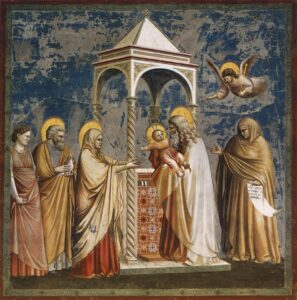Presentation of Jesus in the Temple

The Presentation of Jesus in the Temple, the Fourth Joyful Mystery of the Rosary holds profound importance in the Christian account. This event, also known as the Purification of Mary, underscores the fulfillment of Jewish law and the consecration of the firstborn son to God.
The significance lies in the devout obedience of Mary and Joseph to the Mosaic law, presenting Jesus in the Temple eight days after His birth. This act symbolizes Jesus’ inclusion in the covenant and establishes a connection between the Old and New Testaments.
Moreover, the encounter with Simeon and Anna adds importance. Simeon, guided by the Holy Spirit, recognizes Jesus as the promised Messiah and utters the Nunc Dimittis, acknowledging that he can depart in peace having seen the salvation of Israel. Anna, a prophetess, also witnesses this sacred moment.
The Presentation of Jesus in the Temple becomes a pivotal event foreshadowing Jesus’ role as the Light to the Gentiles and the glory of Israel. It emphasizes the intersection of divine prophecy and earthly fulfillment, reinforcing the divine plan for salvation.
This Joyful Mystery invites believers to contemplate the significance of consecration and the divine purpose inherent in Jesus’ earthly arrival. It marks a transition from the hidden life of Jesus to His public ministry, symbolizing the presentation of the Savior to humanity and the unfolding of God’s redemptive plan.
Scriptures of the Presentation of Jesus in the Temple
And after the days of her purification, according to the law of Moses, were accomplished, they carried him to Jerusalem, to present him to the Lord: As it is written in the law of the Lord: Every male opening the womb shall be called holy to the Lord: And to offer a sacrifice, according as it is written in the law of the Lord, a pair of turtledoves, or two young pigeons.
And Behold there was a man in Jerusalem named Simeon, and this man was just and devout, waiting for the consolation of Israel; and the Holy Ghost was in him. And he had received an answer from the Holy Ghost, that he should not see death, before he had seen the Christ of the Lord.
And he came by the Spirit into the temple. And when his parents brought in the child Jesus, to do for him according to the custom of the law, He also took him into his arms, and blessed God, and said: Now thou dost dismiss thy servant, O Lord, according to thy word in peace; Because my eyes have seen thy salvation, Which thou hast prepared before the face of all peoples: A light to the revelation of the Gentiles, and the glory of thy people Israel.
And his father and mother were wondering at those things which were spoken concerning him. And Simeon blessed them, and said to Mary his mother: Behold this child is set for the fall, and for the resurrection of many in Israel, and for a sign which shall be contradicted; And thy own soul a sword shall pierce, that, out of many hearts, thoughts may be revealed.
And there was one Anna, a prophetess, the daughter of Phanuel, of the tribe of Aser; she was far advanced in years, and had lived with her husband seven years from her virginity.
And she was a widow until fourscore and four years; who departed not from the temple, by fastings and prayers serving night and day. Now she, at the same hour, coming in, confessed to the Lord; and spoke of him to all that looked for the redemption of Israel.
And after they had performed all things according to the law of the Lord, they returned into Galilee, to their city Nazareth. And the child grew, and waxed strong, full of wisdom; and the grace of God was in him. (Luke 2:22-40)
Scripture Commentary
Luke 2:21-40 contains the narrative of the Presentation of Jesus in the Temple, offering rich insights into the significance of Jesus’ early life and the profound responses of those who encountered him. Let’s explore a commentary on this passage:
Verses 21-24: Fulfillment of the Law
The passage begins with the observance of Jewish rituals and laws. Jesus undergoes circumcision on the eighth day, in accordance with the Law of Moses. This act symbolizes his inclusion in the covenant between God and Israel. Following this, the Virgin Mary completes the days of her purification, highlighting the family’s commitment to fulfilling religious obligations. The meticulous adherence to these customs emphasizes the devoutness of Jesus’ earthly parents and sets the stage for the unfolding divine plan.
Verses 25-35: Simeon's Prophetic Utterance at the Presentation of Jesus

Simeon, a just and devout man, guided by the Holy Spirit, plays a central role in this narrative. His patient waiting for the consolation of Israel is rewarded with a divine revelation. Taking Jesus into his arms, Simeon blesses God and acknowledges the infant as the fulfillment of God’s promise—a Savior and a light for all people. Simeon’s words foreshadow the universal nature of Jesus’ mission, reaching both Gentiles and the people of Israel. The reference to Jesus being a sign contradicted and the mention of a sword piercing Mary’s soul anticipate the challenges and opposition that will accompany Jesus’ ministry. Simeon’s proclamation serves as a pivotal moment, affirming Jesus’ divine purpose and the transformative impact he will have on humanity.
Verses 36-40: Anna's Testimony

The introduction of Anna, a prophetess of advanced age, adds another layer of confirmation to Jesus’ significance. Her continuous presence in the temple, marked by a life of devotion through fasting and prayer, demonstrates a deep spiritual commitment. Anna recognizes Jesus as the Redeemer and shares this revelation with those awaiting the redemption of Israel. Her testimony contributes to the growing awareness of the divine role of Jesus Christ.
Overall Significance:
This passage holds profound significance in the Gospel narrative. It establishes Jesus’ early adherence to Jewish customs while emphasizing the spiritual insight and divine confirmation provided by righteous individuals like Simeon and Anna. The themes of fulfillment of prophecy, universal salvation, and the anticipation of challenges in Jesus’ journey are prominently featured. The encounter in the temple becomes a prelude to Jesus’ public ministry, setting the stage for the unfolding redemptive plan.
In summary, Luke 2:21-40 offers a glimpse into the early life of Jesus, highlighting the faithfulness of his earthly parents to religious customs and the prophetic testimonies of Simeon and Anna, affirming the divine nature of the infant Messiah and the universal scope of his mission.
Feast of Candlemas
The Feast of Candlemas, also known as the Presentation of the Lord or the Purification of the Blessed Virgin Mary, is a Christian celebration observed on February 2nd. This feast commemorates an event described in the Gospel of Luke (Luke 2:22-40), which narrates the presentation of Jesus in the Temple and the ritual purification of Mary.
The feast is primarily associated with the following elements:
- Presentation of Jesus in the Temple
The Gospel of Luke recounts that, in accordance with Jewish law, Mary and Joseph brought the infant Jesus to the Temple in Jerusalem forty days after his birth. This act was to fulfill the requirement of the Law of Moses, which required the consecration of the firstborn male and the purification of the mother after childbirth. - Recognition by Simeon and Anna
The narrative introduces two significant figures in the Temple, Simeon, and Anna. Simeon, a devout man, had been promised by the Holy Spirit that he would not die before seeing the Messiah. When Jesus was presented in the Temple, Simeon took him into his arms, praising God and declaring Jesus to be the salvation for all people. Anna, an elderly prophetess, also recognized Jesus and spoke about him to those who were awaiting the redemption of Jerusalem. - Candles and Blessing
The name “Candlemas” is derived from the tradition of blessing candles on this day. In some Christian denominations, a procession of candles takes place during the worship service, symbolizing Jesus as the Light of the World. The candles may be lit and blessed as a representation of Christ’s presence dispelling darkness. - Symbolism of Light
The lighting of candles and the association with light in Candlemas symbolize the spiritual illumination brought by Jesus. It is a reminder that Jesus is the light that dispels the darkness of sin and ignorance. - Conclusion of the Christmas Season
Candlemas is considered the conclusion of the Christmas season in some Christian traditions. It falls forty days after Christmas Day, marking the end of the Nativity cycle.
Candlemas holds cultural and liturgical significance in various Christian traditions, including the Roman Catholic Church, the Anglican Communion, and some Protestant denominations. It is a day to reflect on the presentation of Jesus in the Temple, the fulfillment of prophecies, and the recognition of Jesus as the Savior and Light of the World. The use of candles and the associated blessings serve as visual and symbolic expressions of these theological themes.
Download our Joyful Mysteries pdf Document
We have a Joyful Mysteries pdf, available for your use. It is free to download and share. It can be printed and used for praying the Rosary and is an excellent aid for anyone, especially for beginners. The author still uses them to this day.
To view our Joyful Mysteries pdf page, click the link. To go straight to the pdf, click the button below.

Charles Rogers is a resident of South Carolina and a retired computer programmer by trade. Raised in various Christian denominations, he always believed in Jesus Christ. In 2012, he began experiencing authentic spiritual encounters with the Blessed Virgin Mary, which led him on a seven-year journey at her hand, that included alcohol addiction, a widow maker heart attack and death and conversion to the Catholic Faith. He is the exclusive author and owner of Two Percent Survival, a website dedicated to and created in honor of the Holy Mother. Feel free to email Charles at twopercentsurvival@gmail.com.

We strive to provide the most complete and highest quality material we can for you, our readers. Although not perfect,
it is our desire and prayer that you benefit from our efforts.

